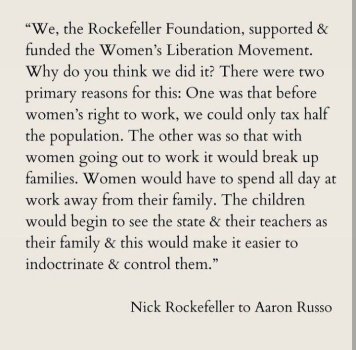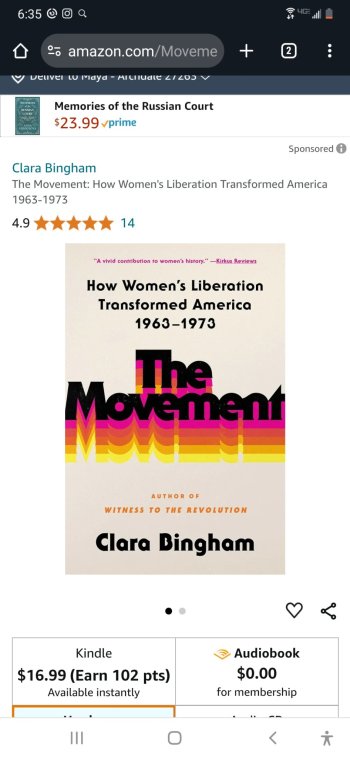Except I'm not claiming implied. I'm saying her business was not a competing priority to her household. Can you prove that my interpretation is wrong? Why is yours more likely based on evidence?
The purpose of the Proverb has been interpreted variously. More symbolically (and more likely), it is the portrait of a household ruled by a Woman's Wisdom (as, the husband 'trusts her judgment') and because of his trust in her, he now has a worthy wife and children, profit from her earnings, a great household and is renown in the community.
In contrast, another interpretation is that the 'ideal' Woman of Worth is an impossible standard to obtain,
even way back when. After all, even if a woman doesn't work outside the home, not everything is going to run smoothly every day. Children get sick...animals get sick...even the wife gets sick. Sometimes a housewife is unable to get what she needs to make dinner. She may have to go to different stores, and that will set her running
behind. One of her children may need extra attention that day. Plus, if she is running a business in addition to her household duties, it would be unrealistic to believe that her business would never be a competitive priority to her household.
It's funny how you said earlier that women aren't designed to "have it all." And yet...isn't that what the Woman of Worth is doing?
It means guide the house like it says in 1 Timothy. A home manager.
When did I say all husbands are like the husband in Proverbs 31 or imply it? Even a Godly woman can have a husband that refuses to mature. Submissiveness and valuing home is a matter of obedience to the Lord whether the husband is Godly or not. It just so happens that most husbands respond extremely well to being respected in their homes.
I think that many people understand 'submissiveness' to be something that it's not, PLUS, they don't understand that we are being called to "submit to ONE ANOTHER out of reverence out of reverence to Christ" (Eph. 5:21).
My question is, are you really saying stigma against women being homemakers has nothing to do with the feminist movement or women's liberation? I see nothing to say that there's no connection.
I'm saying that the 'stigma' against women being homemakers was already in play before feminism got involved. Historically, women have never really been revered as housewives, even from their own husbands, nor were they thought of as capable of doing anything else.
Feminism began to challenge erroneous claims about women...such as, women's brains were inferior to men's, rendering women incapable of voting...and that voting would cause infertility in women...or that the majority of women didn't WANT to vote.
...NONE of which was true.
Women get the short end of the stick. If a woman is a homemaker, she's frowned upon for not using her God-given talents for something more beneficial to society. If a woman is a working mother, she's frowned upon for not being at home, doting on her husband and children. She can't WIN! One of the goals of feminists is to change these
attitudes, and allow women to make choices without a stigma attached to either choice.
You said I only quoted one feminist. Technically I quoted at least two. Can you find feminists that agree with husband's being the head of their homes? This is what Scripture teaches. But feminism rejects this. Scripture and feminism are incompatible.
You may have quoted two, but you said "many." Two isn't "many."
The Bible does not teach that the husband is "head of the HOUSE"; only that the husband is head of the WOMAN. There are instances in the bible that demonstrate that both mother and father have EQUAL AUTHORITY in the house. Plus, there is nothing in the Bible that says that the husband isn't allowed to
relinquish his 'authority' over his wife. Believe me, there are plenty of men who would LOVE to give all decision-making power over to their wives, so they don't have to bother with it.
Not so much a matter of feminism, but of interpretation.
I say homemaking is a blessing because that has been my personal experience. But there's plenty of Scripture that says we are blessed for obeying the Lord in the face of mocking, opposition, and ridicule.
As you say, homemaking may be a blessing for YOU because of your experience. Not so much for others because of their experiences.
Being a keeper of the home is a matter of preventing the Word of God from being blasphemed so it means a lot, especially in a culture where news anchors and celebrities mock housewives on public television.
Housewives have been made into a stereotype since the 1940's, because many have no clue what goes into homemaking. They paint the picture of a woman getting her nails done (with her husband's money) and eating bon-bons while watching t.v. There may have been a few women who did this, but the 'average' housewife WITH CHILDREN is and was, often
harried. Her 'burnout' wasn't taken seriously by her spouse or even doctors.
These days, more and more men are joining the ranks of stay at home dads, and many of them are finding out that being SAHD
isn't as 'glamourous' as they thought! They're finding out that homemaking is actually WORK!
Seems that women get the short end of the stick no matter WHAT they do. If they are SAHM, they're criticized. If they join the workforce, even if the income is necessary, they're criticized. It's a no-win situation.
What feminism's aim was, was to change the archaic and often erroneous attitudes about women's "inferior" roles.
Think that's happened yet?




